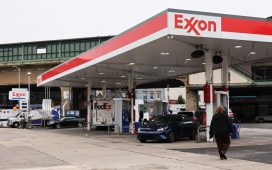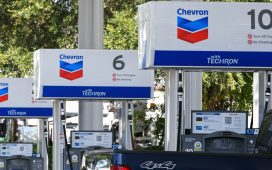With help from Aitor Hernández-Morales, Catherine Boudreau and Anthony Adragna
Editor’s Note: Morning Energy is a free version of POLITICO Pro Energy’s morning newsletter, which is delivered to our subscribers each morning at 6 a.m. The POLITICO Pro platform combines the news you need with tools you can use to take action on the day’s biggest stories. Act on the news with POLITICO Pro.
— The path to net-zero carbon dioxide emissions by 2050 will require the wholesale transformation of how energy is produced and used across the world, the International Energy Agency said Tuesday morning in a new report.
— The Supreme Court sided with fossil fuel companies in a key case on Monday, but the larger fight over whether they must pay cities and states to protect against the threats caused by climate change has yet to be decided.
— President Joe Biden is in Michigan Tuesday to visit a Ford facility and get a glimpse at its new, all-electric F-150 truck before its public release later this week.
WELCOME TO TUESDAY! I’m Kelsey Tamborrino, back in the saddle as your fill-in ME host. NRDC’s Joan Matthews notched the trivia win for correctly naming Enniscorthy, Ireland as Eilis’ hometown in the movie “Brooklyn.” For today: Which of William Shakespeare’s plays is the longest? Send your tips and trivia answers to Matthew at [email protected].
Check out the POLITICO Energy podcast — all the energy and environmental politics and policy news you need to start your day, in just five minutes. Listen and subscribe for free at politico.com/energy-podcast. On today’s episode: Oil wins a legal battle, but the war goes on
THE LONG SHOT ROAD TO NET-ZERO: Existing global climate pledges, even if they’re fully reached, fall short of what is needed to hit net-zero carbon emissions by 2050 and provide the world a fighting chance at limiting the increase in global temperatures to 1.5 degrees Celsius, according to the IEA report, which was requested ahead of November’s COP26 meeting in Glasgow.
Today’s report instead lays out a timetable to shift the world’s fossil fuel-reliant energy economy to one dominated by renewables. “The scale and speed of the efforts demanded by this critical and formidable goal … make this perhaps the greatest challenge humankind has ever faced,” said IEA Executive Director Fatih Birol in a statement.
The highlights: To reach net-zero by 2050, the world would need to see all new buildings become zero-carbon ready by 2030, as well as see 1,020 gigawatts in annual solar and wind additions. By 2035, there would need to be no new internal combustion engine car sales. By 2040, 50 percent of existing buildings must have been renovated so that they are zero-carbon and all coal and oil power plants would need to have been phased out. By 2050, the report said, almost 70 percent of electricity would need to come from solar or wind and more than 90 percent of industrial production would need to be low-emissions.
Go green or go home: The IEA report also insisted that there is only one way to get to net-zero emissions: the “immediate and massive deployment of all available clean and efficient energy technologies.” To that end, it calls for two-thirds of the total energy supply by 2050 to come from wind, solar, bioenergy, geothermal and hydroelectric sources. In the immediate future, the report also called for dramatically ramping up renewable energy deployment, with 630 GW of solar and 390 GW of wind installed annually by 2030 — four times the record level of renewable energy installed in 2020.
Tech talk: The report notes that all of the technologies “needed to achieve the necessary deep cuts in global emissions by 2030 already exist, and the policies that can drive their deployment are already proven.” In 2050, however, almost half the reductions will come from technologies that are currently only at the demonstration or prototype phase, IEA says. That comes as climate envoy John Kerry was criticized this week for saying 50 percent of the reductions needed to get to near-zero emissions by 2050 or 2045 “are going to come from technologies we don’t yet have.”
Transition power: Nuclear and hydropower also have a role to play in the green transition, the IEA report said. Despite concerns regarding the safety of the former and the environmental impact of the latter, the report found that these sources, now the largest sources of low-carbon electricity, will be critical to providing the power to compensate for the flexible generation capacity of renewables.
Power-up: Electrification is key to slashing emissions, and the IEA wants electricity to account for nearly 50 percent of total energy consumption by 2050. For that to happen, the 785 million people who now have no access to electricity need to be connected to the grid, and cleaner options need to be provided for the 2.6 billion that rely on carbon-heavy options to prepare their food. The challenge isn’t just about getting clean power to these people, but making it affordable enough for them to actually use it.
How to make it happen: The IEA report argued that governments need to set ambitious targets and establish competitive auction systems to boost the roll-out of green energy. They should scrap fossil fuel subsidies and implement carbon pricing and policies aimed at disincentivizing the use of high-carbon energy. Moreover, governments need to start investing in the smart grids that will be needed to get clean energy everywhere.
Spread the wealth: The green transition has the capacity to create 14 million jobs by 2030, per the report. But it stressed that the work opportunities need to be spread around to ensure that as fossil fuel jobs vanish, newly unemployed workers can make the switch to working at clean energy facilities.
BIG OIL GETS SCOTUS BOOST: The Supreme Court on Monday ruled in BP et al. v. Baltimore, a case hinging on a dry legal question about the scope of appellate courts’ authority to resolve disputes over whether lawsuits belong in state or federal court. With its decision to return the case to the lower courts, the high court gave fossil fuel companies a boost against the litany of climate change lawsuits brought against them by states and localities, Pro’s Alex Guillén reports.
Oil industry groups welcomed the ruling, even as it left the bigger legal questions around their ultimate liability for climate change unanswered. The “narrow procedural ruling” may not derail the climate suits brought by Baltimore and other states and cities, said Richard Wiles, executive director of the Center for Climate Integrity. “While today’s ruling may cause a delay for some municipalities seeking their day in court, Big Oil can’t escape accountability forever.”
Views from the Hill: Sen. Sheldon Whitehouse (D-R.I.) told ME in a statement he’s “always disappointed when the day of reckoning for Big Oil is postponed,” but echoed that the fight isn’t over. “This case was a very narrow procedural ruling that did not cut off courts as an avenue for state and local governments to seek redress for the climate-related damages, although it did give defendants a tool to game the question of removal to federal court,” he said.
STRUCK BY LIGHTNING: Biden is in Dearborn, Mich., today to speak at the Ford Rouge Electric Vehicle Center, where he will deliver remarks and get an advanced look at Ford’s electric pickup. Ford is expected to officially unveil the F-150 Lightning on Wednesday, in what will likely mark a milestone for the Biden administration’s push to electrify U.S. transportation.
As Pro’s Lorraine Woellert writes: Pickups, especially the F-150, are deeply rooted in the American psyche and the economy. Their sales are heavily concentrated in conservative states where high-speed electric charging stations are few and far between.
The Lightning, while Prius-like in its conservation, “will muscle its way onto petro-masculinity’s territory with beefy torque and plenty of horsepower,” Lorraine writes. “Ford has promised that the electric vehicle will have the same DNA as its internal combustion brethren.” It will also be built by UAW workers, driving home Biden’s goal of providing union jobs as part of his push for a cleaner economy.
YOU BUILD ME UP: The Biden administration unveiled a plan Monday to cut emissions from buildings using performance standards, grant funding and appliance rules, Pro’s Eric Wolff reports. The standards will set emissions reduction targets for structures owned by the government, the largest owner of real estate in the country. The Energy Department also announced $30 million in workforce development grants to train workers to retrofit old buildings.
Related: Sen. Martin Heinrich (D-N.M.), joined by nine other Democrats, will today introduce a resolution calling for accelerating the electrification of households, buildings, and businesses. Backers argue speeding electrification around the country would address climate change, while creating millions of jobs with strong labor standards. Read a fact sheet on the resolution.
SITE FOR SORE EYES: Public interest groups, including Democracy Forward, are calling on the General Services Administration and the U.S. Digital Service to address “substantial barriers to public access to agency rulemaking dockets” under the new version of the government’s online rulemaking information directory, which was revamped during the Trump administration. The new website “represents an extraordinary retrenchment in public access,” the groups argued.
JUST SCRATCHING THE SURFACE: House Republican leaders are planning to introduce their own infrastructure proposal this week, as the White House and Congress try to find some bipartisan middle ground, Pro’s Sam Mintz reports. According to a GOP committee aide, the plan, led by House Transportation and Infrastructure ranking member Sam Graves (R-Mo.), is designed as a surface transportation reauthorization and would cost more than $400 billion over five years.
The STARTER Act 2.0, as it’s called, includes a resiliency title and changes to the environmental review process, and “just a number of things that make a lot of sense,” said Rep. Garret Graves (R-La.), another Transportation Committee Republican.
MORE QUESTIONS THAN ANSWERS: Reps. Carolyn Maloney, the chair of the Oversight Committee, and Bennie Thompson, the chair of the Homeland Security Committee, attended a joint staff briefing with Colonial Pipeline on Monday, after which they said in a statement they “remain extremely concerned about the rise in ransomware attacks and the threat to our nation and its critical infrastructure.”
According to the lawmakers, Colonial Pipeline refused to share any specific information regarding the reported decision to pay a $5 million ransom. The cyberattack, they said, “not only highlights glaring vulnerabilities in our critical infrastructure, it also exposes a marketplace in which it may be easier for a company to pay off a criminal than put resources towards preventing and defending against attacks.”
FOR YOUR RADAR: A trio of Interior Department nominees will testify before the Senate Energy Committee this morning: Robert Anderson to be Interior solicitor, Shannon Estenoz to be assistant secretary for fish and wildlife and parks; and Tanya Trujillo to be an assistant secretary for water and science.
THE NEW HOT JOB: A record 31 publicly traded companies in the U.S. hired their first chief sustainability officer last year, more than in the past three years combined. Today, 95 executives hold that title, up from 29 a decade ago, when the recruiting firm Weinreb Group published its seminal report on the emergence of the CSO.
The firm surveyed those 95 CSOs and found that more than half are women. While Weinreb Group didn’t have enough responses to come up with reliable data on its own, it cited a GreenBiz survey of 522 sustainability professionals at the manager-to-C-suite level that found just 16 percent of this group identified as nonwhite.
When asked what has changed the most in the last decade, more than two dozen CSOs said investor interest. Investors are shaping the issues companies focus on and how they address them. The biggest issues are climate, equity, environmental justice and social justice.
— “Inslee signs ambitious environmental protection laws,” via Associated Press.
— “DAPL cites Colonial Pipeline outage as reason to remain open,” via S&P Global Platts.
— “Elliott urges Duke Energy to separate into three companies,” via Bloomberg.
— “Expect more wildfires this year. And expect lawmakers to disagree about them,” via Roll Call.
— “Environmental groups sue federal mining agency over West Virginia mine cleanup process,” via The Hill.
— “BP’s lobbying for gas shows rifts over path to net-zero emissions,” via Reuters.
THAT’S ALL FOR ME!









